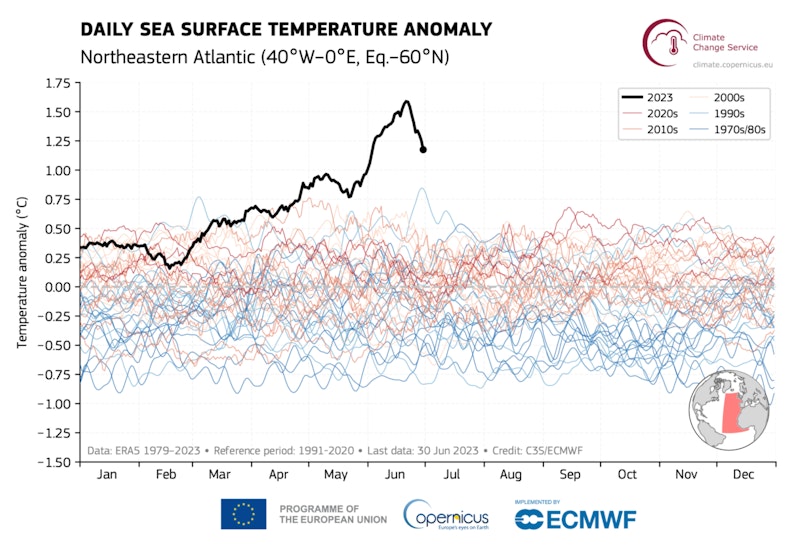In the News
Global Heating and the Unintended Consequences of Global Governance

11th October 2023
Studying human interventions in the carbon cycle? Here’s an update you might have missed, as it was publicised in August. Scientists have discovered that we have been carrying out a massive experiment in geoengineering of the climate since 2020. Why 2020? This is when the UN’s International Maritime Organisation enforced new regulations to cut sulfur pollution from ships. This pollutant previously emitted by cargo ships circling the globe was helping to seed clouds.

The IMO's new regulation has cut aerosols by 80% and improved air quality, with many benefits not least reduced ocean acidification, but this has also had an impact on the climate. Reduced cloud cover (the absence of ‘ship tracks’) has resulted in significant, additional warming of our climate. In particular, this phenomenon has been observed in the North Atlantic in 2023.
Back in June, the science community was talking about the unprecedented temperatures over the North Atlantic, including the Plymouth Marine Laboratory and the UK’s Met Office.

By July 2023, sea surface temperatures reached 25 degrees C, 1 degree warmer than the previous record in 2020.
One obvious cause of warming worldwise is our continued burning of fossil fuels for energy, the emissions from which trap heat that the oceans are steadily absorbing. Less dust from the Sahara, as a result of specific weather conditions, may have been a key factor this year. But recently published work by a number of science teams suggests another important factor. The use of AI to identify ship tracks from satellite images has provided us with a clear indication that a lack of these distinctive, linear cloud trails (both visible and invisible) have played a role in exceptional heating this year.
In the shipping corridors of the Atlantic, there has been a 50% boost to the warming effect of human carbon emissions due to increased light. (One of the other findings of scientists was that there has been general compliance with the new IMO regulations for shipping.)
Scientists have drawn parallels with the world missing the impact of a ‘fairly large volcanic eruption each year’ in terms of the reduction in aerosols that create clouds, which reflect radiation from the sun. Sulfate particles seed clouds by creating nuclei for vapour to condense into droplets, creating clouds. They also brighten existing clouds by creating smaller, more numerous droplets.
Even though the impact on global heating of the IMO’s unintended experiment is quite the reverse of what humanity and the planet needs, scientists see it as demonstrating that intentional geoengineering could work - that we could have an impact on the reflectivity of clouds, to cool the planet. Injecting salt particles from sea water into the air (rather than the pollutant sulphur dioxide) could make clouds more reflective. However, there are still many uncertainties to explore, as the impact of aerosols could vary with cloud type and height. There's more science to do.
Here’s the original thread on X/Twitter which got me interested:
Massively under-reported science story because there's so much going on right now but...it turns out that we might have figured out what's causing this very scary spike.
— Hank Green (@hankgreen) August 4, 2023
Quick thread, on how WE'VE BEEN ACCIDENTALLY GEOENGINEERING FOR DECADES...but then we stopped: pic.twitter.com/pLWzgOr8C7
And there’s a 6-minute video about this phenomenon by vlogbrothers: The biggest science story of the week which is interesting for its explanation of the science but also the call to action:
‘We’re in the ‘overlap period’, ‘the period in which the problem is big enough that we can’t ignore it and we still have time to do something about it.’
This story was originally covered in the journal Science in August: ‘We’re changing the clouds.’ An unintended test of geoengineering is fuelling record ocean warmth
September 2023 was the warmest on record, by a large margin according to the EU’s Climate Change Service. Records go back to 1940. Read more about this here.
Finally, anyone in any doubt about the scale of global shipping might like to take a look at the animation shipmap.org
The data visualisation above was created by Kiln and the UCL Energy Institute.
You might also like

Acidification of the oceans from CO2 emissions
23rd October 2017
Tri-Dominoes - Climate Change (Paper 1) | Revision Activity
Teaching Activities
'Clear the Deck’ Interactive Revision Quiz for Paper 1: Climate Change
Quizzes & Activities